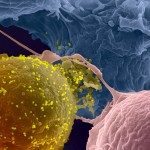Link to Pubmed [PMID] – 31988181
Link to DOI – 10.4049/jimmunol.1900774
J Immunol 2020 03; 204(5): 1119-1133
Mucosal-associated invariant T (MAIT) cells are important for immune responses against microbial infections. Although known to undergo marked numerical changes with age in humans, our understanding of how MAIT cells are altered during different phases across the human life span is largely unknown. Although also abundant in the tissues, our study focuses on MAIT cell analyses in blood. Across the human life span, we show that naive-like MAIT cells in umbilical cord blood switch to a central/effector memory-like profile that is sustained into older age. Whereas low-grade levels of plasma cytokine/chemokine were apparent in older donors (>65 y old), surprisingly, they did not correlate with the ex vivo MAIT hyperinflammatory cytokine profile observed in older adults. Removal of MAIT cells from older individuals and an aged environment resulted in the reversal of the baseline effector molecule profile comparable with MAIT cells from younger adults. An upregulated basal inflammatory profile accounted for reduced Escherichia coli-specific responses in aged MAIT cells compared with their young adult counterparts when fold change in expression levels of GzmB, CD107a, IFN-γ, and TNF was examined. However, the magnitude of antimicrobial MR1-dependent activation remained as potent and polyfunctional as with younger adults. Paired TCRαβ analyses of MAIT cells revealed large clonal expansions in older adults and tissues that rivalled, remarkably, the TCRαβ repertoire diversity of virus-specific CD8+ T cells. These data suggest that MAIT cells in older individuals, although associated with large clonal TCRαβ expansions and increased baseline inflammatory potential, demonstrate plasticity and provide potent antimicrobial immunity.
